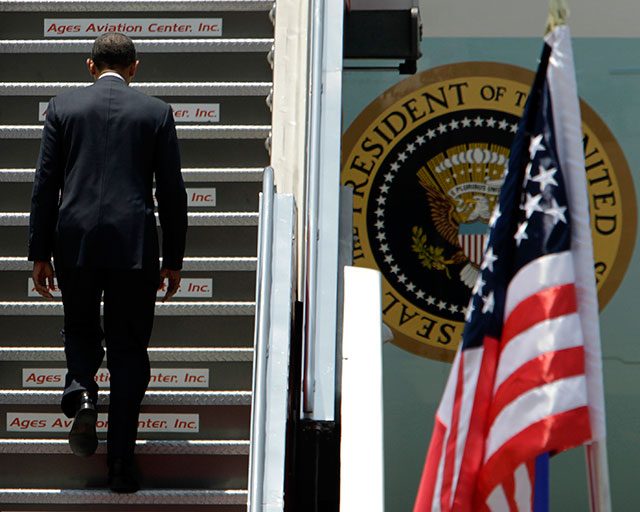SUMMARY
This is AI generated summarization, which may have errors. For context, always refer to the full article.

MANILA, Philippines (UPDATED) – US President Barack Obama ended his week-long Asian tour here after a two-day state visit intended to “reaffirm” his country’s “enduring alliance” with the Philippines.
Obama was given departure honors at AGES Aviation Center, Balagbag Ramp in Pasay City, where he was sent off by Philippine officials led by Vice President Jejomar Binay.
He boarded Air Force One after waving to the crowd gathered at the tarmac. The plane took off at 11:29 am.
The Philippines was the final stop in Obama’s tour of Asia that brought him to Japan, South Korea, and Malaysia.
This was Obama’s first time in the Philippines, and the first time in 11 years that a sitting US President visited the country.
During his trip, Obama was given state honors at a welcome ceremony in Malacañang, attended expanded bilateral meetings with President Benigno Aquino III, and was feted at a state dinner. (WATCH: LIVE: Obama visits Manila, Day 1)
On day 2, Aquino honored Filipino veterans and the partnership of American and Filipino soldiers, before visiting the American cemetery in Taguig.
Coming to Asia, the United States was expected to argue that its rebalancing policy – of withdrawing US military, economic and human resources from Middle East wars and deploying them to emerging Asia – remains on track.
Aside from Binay, Obama was sent off by Metro Manila Development Authority Head Francis Tolentino, US ambassador to the Philippines Philip Goldberg, Philippine ambassador to the United States Jose Cuisia, Foreign Affairs Secretary Albert del Rosario, Interior Secretary Mar Roxas who was designated as Cabinet Member in Attendance by the President.
Focus on security
Philippine officials had expected the US leader’s visit to provide a “clearer understanding” of the strategic partnership of the two countries on a range of areas, including defense and security.
As expected, defense and security issues were at the forefront of the countries’ discussions.
Just hours before his visit, both countries signed the Enhanced Defense Cooperation Agreement (EDCA) which allows increased rotational presence of American troops in the country.
In his parting message to Filipinos at his final speaking engagement in Manila on Tuesday, Obama assured the Philippines of the US’ “ironclad” commitment to come to its defense in times of need, as provided under the PH-US Mutual Defense Treaty.
“This treaty means our two nations pledge, and I am quoting, ‘our common determination to defend themselves from external armed attacks,’” he said at Fort Bonifacio, where he addressed war veterans, and Filipino and American soldiers.
“And no potential aggressor can be under the illusion that either of them stands alone. In other words our commitment to defend the Philippines is ironclad. The United States will keep that commitment because allies will never stand alone.”
Those were the same remarks he gave during his toast at the state dinner hosted by Aquino in his honor on Monday: “Let me say tonight on behalf of the American people, we are honored and proud to call you an ally and a friend. Through our treaty alliance, the United States has an ironclad commitment to defend you, your security and your independence.”
Asked twice at a press conference early Monday, however, Obama did not give a categorical commitment that the US will fight alongside the Philippines if push comes to shove in its territorial row with China.
In Japan, he vowed to come to the defense of Tokyo if it were to be attacked by China. Both Japan and the Philippines are involved in territorial disputes.
Obama cited a treaty it has with Japan for its statement. The United States’ existing treaties with the Philippines on the other hand, are not as specific.
However, Obama did express support for the Philippines’ decision to raise its territorial dispute with China before an international arbitral tribunal, and the country’s bid for a binding Declaration on of the Conduct of Parties in the South China Sea (DOC).
He also emphasized the EDCA is not about China.
Strong ties
Aside from defense and security, Obama and Aquino discussed trade matters, and increased cooperation for helping victims of typhoon Yolanda, and the country’s economic growth.
Aquino described his talks with Obama as “comprehensive, historic, and significant – embodying our shared values and aspirations.”
Obama too expressed satisfaction with his Asian tour.
“Here’s, I think, the general take away from this trip: Our alliances in the Asia Pacific have never been stronger. I can say that unequivocally,” he said.
“Our relationships with ASEAN countries, in Southeast Asia, have never been stronger. I don’t think that is subject to dispute.” – Rappler.com
Add a comment
How does this make you feel?
There are no comments yet. Add your comment to start the conversation.